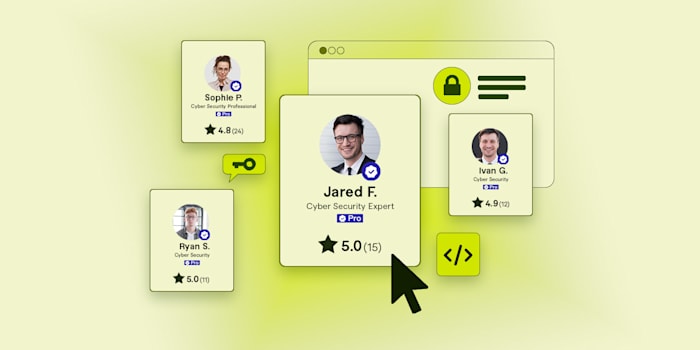Ethics of Web Scraping: Legal and Ethical Considerations from Experts
Ethical web scraping balances data collection with legal compliance and site policies
 March 5, 2025
March 5, 2025 5 minute reading
5 minute reading
Web scraping has become essential for data collection, market analysis, and competitive intelligence. However, as web scraping technology advances, so do ethical and legal concerns.
While some forms of web scraping are legal, others fall into gray areas or outright violations of data privacy and intellectual property rights.
To help navigate the complexities of ethical and legal web scraping, Fiverr freelancers provide insights on best practices, legal compliance, and responsible scraping techniques.
TL;DR
Do’s of web scraping:
Comply with GDPR, CCPA, and other privacy laws.
Apply data for ethical purposes like research and journalism.
Use rate limiting and delay requests to avoid overloading servers.
Scrape only publicly available data without circumventing security barriers.
Check for available APIs before scraping and follow API usage agreements.
Review the website’s Terms of Service (ToS) and adhere to robots.txt guidelines.
Don’ts of web scraping:
Scrape data manually when an API is readily available.
Overwhelm websites with rapid, concurrent scraping requests.
Collect personally identifiable information (PII) without consent.
Ignore site policies and scrape restricted sections without permission.
Use scraped data to exploit, harm, or mislead individuals or businesses.
Hack into restricted areas or bypass CAPTCHAs and authentication walls.
1. Respect website terms of service and robots.txt
Before engaging in any web scraping activity, review the website’s Terms of Service (ToS). Many websites explicitly state whether scraping is allowed and under what conditions. Ignoring these guidelines can lead to legal consequences or even website bans.
As Umar Khalid, an e-commerce manager and web scraping specialist, explains:
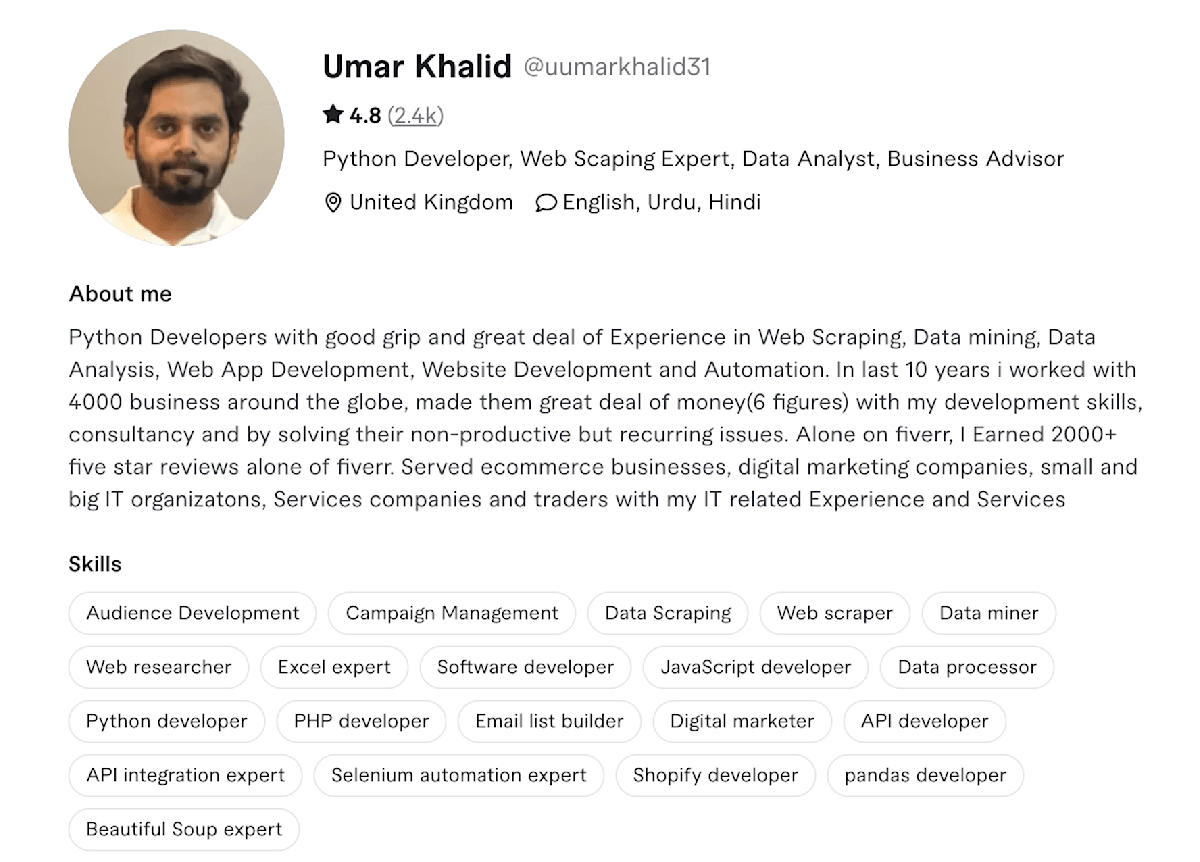
“First, review the website’s terms and conditions to check for any explicit restrictions on web scraping. Next, assess whether the site employs bot blockers, as their presence indicates an intent to prevent automated data extraction.”
Connect with FreelancerSimilarly, robots.txt files provide guidelines on which website sections are accessible to web crawlers. While not legally binding, disregarding these directives can result in IP bans, CAPTCHAs, or even legal action from website owners.
2. Avoid scraping personal or sensitive data
Data privacy laws such as GDPR in Europe and CCPA in California set strict guidelines on collecting and handling personal data. Web scrapers must avoid extracting personally identifiable information (PII) without explicit consent.
Faheem S, a backend and mobile app developer, highlights this concern:
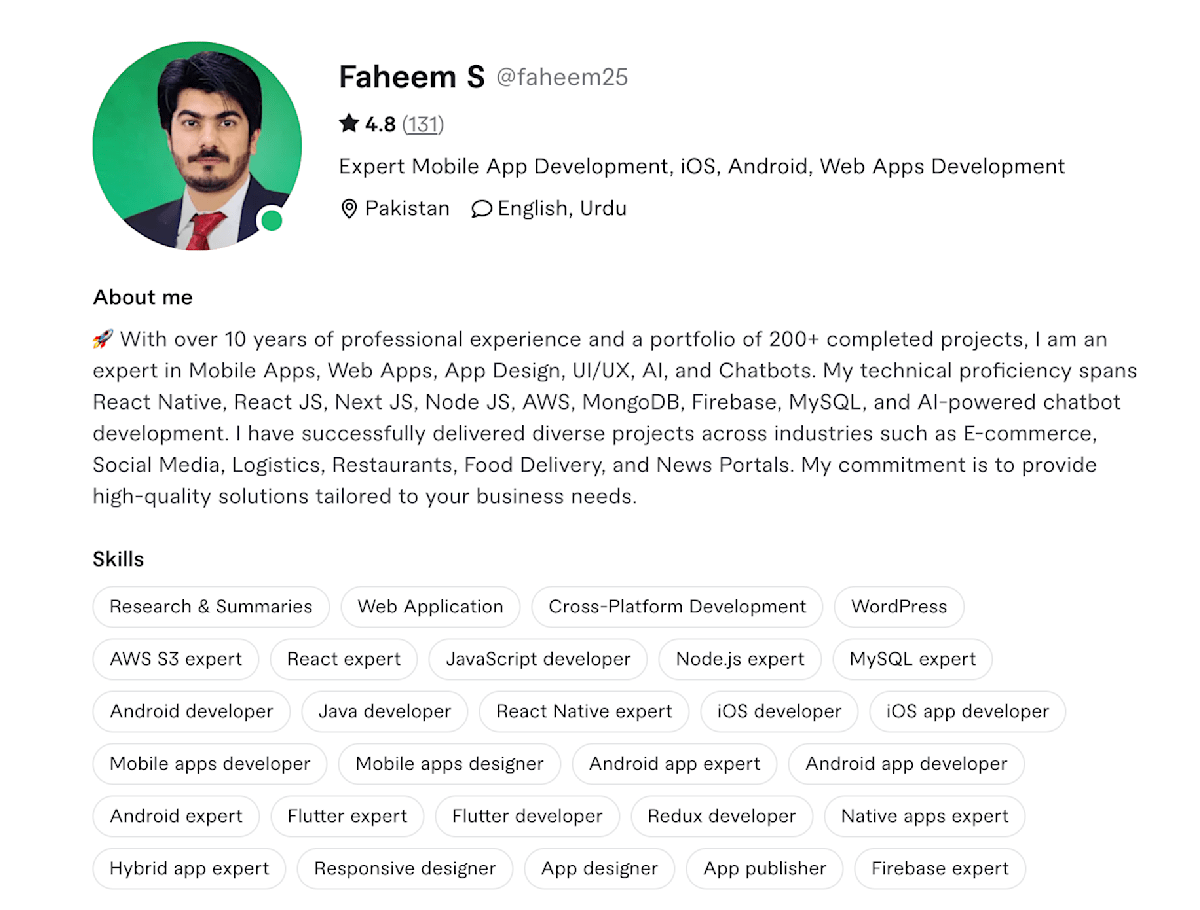
“I avoid scraping personal or sensitive data without explicit consent. If handling user data, I ensure compliance with privacy laws such as GDPR or CCPA.”
Connect with FreelancerThis means that scraping publicly available information, such as product listings or blog articles, is generally acceptable. But, scraping private user details, login credentials, or payment information is unethical and likely illegal.
3. Minimize impact on website performance
Excessive or rapid requests can overload servers when web scrapers extract data too quickly. Websites may crash or slow down if too many automated processes extract data simultaneously. Ethical web scraping involves implementing rate-limiting techniques to avoid disrupting a site’s normal operations.
As Haroshit Mondal, a digital marketing expert, advises:

“Avoid overloading websites. Don’t overwhelm the website with too many requests in a short time. You can use rate limiting to avoid this.”
Connect with FreelancerScrapers should space out requests, use caching to avoid redundant data collection, and respect server load.
4. Do not bypass security measures
Many websites employ security features like CAPTCHAs, authentication walls, and encrypted content to protect data. Circumventing these barriers to access restricted information is a legal and ethical violation. Ethical scrapers should only extract publicly accessible data without engaging in hacking or bypassing security protocols.
Ismail1190, a web scraping specialist, emphasizes:
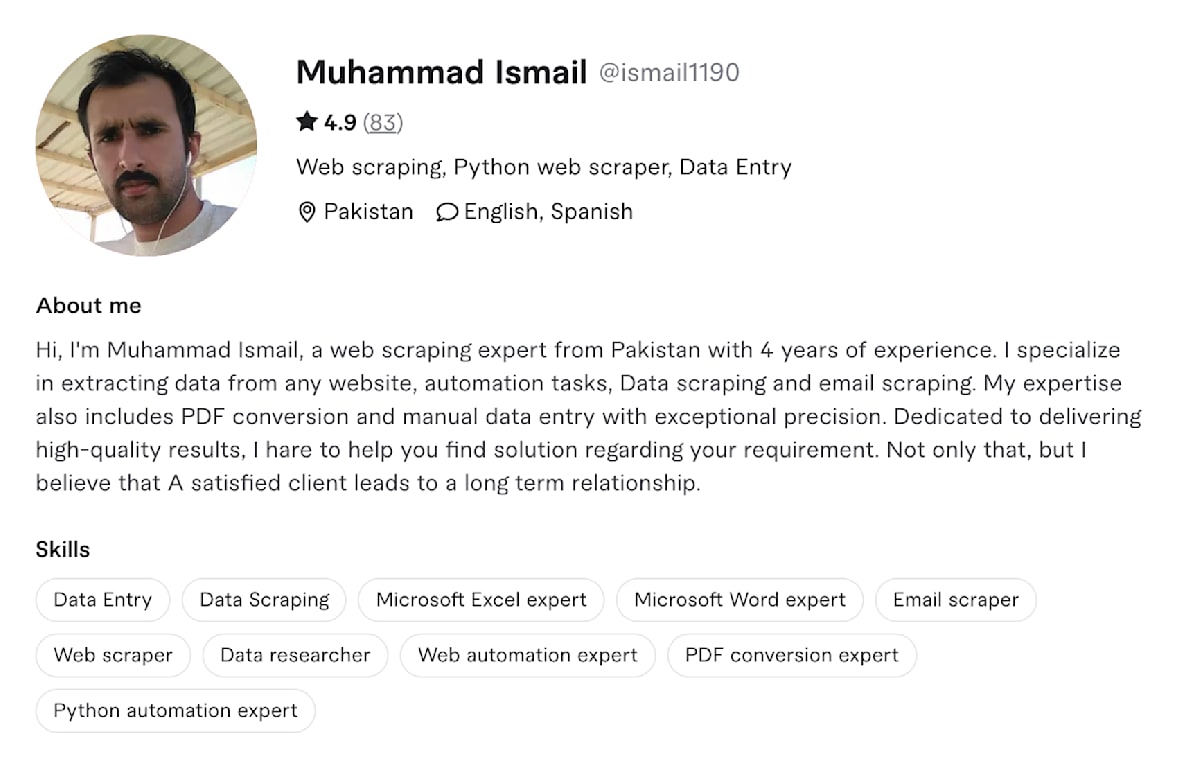
“The core principle of ethical web scraping is clear: never engage in hacking or bypassing security measures to obtain data.”
Connect with FreelancerAttempting to bypass these protections can result in legal action, account suspensions, or blacklisting by website administrators.
5. Use data responsibly and ethically
Scraped data should be used for ethical purposes, such as research, journalism, or data analysis. Exploitative scraping, such as reselling someone else’s data without permission or using scraped information to harm businesses or individuals, is highly unethical.
Ali Nawaz, a lead generation specialist, states:
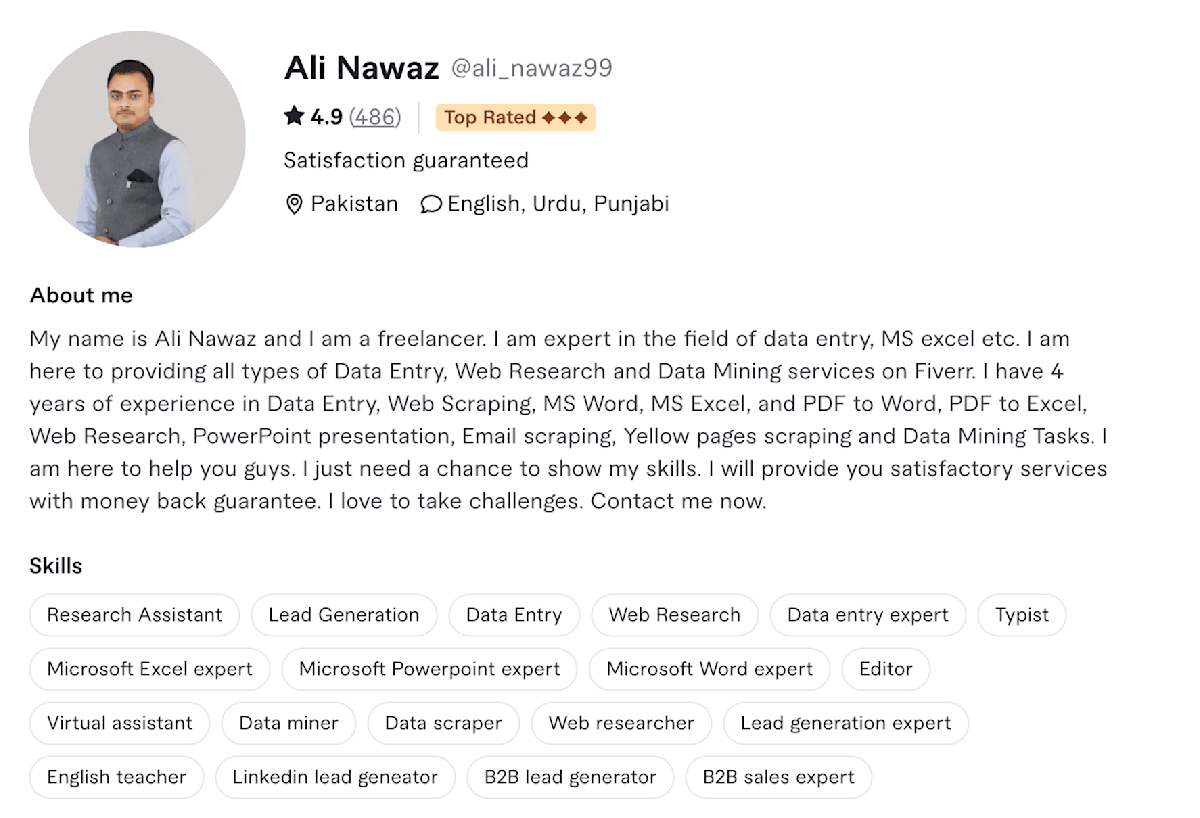
“Avoid scraping data that may harm individuals or organizations. Be transparent about data collection and usage.”
Connect with FreelancerUnethical data use can lead to reputational damage, legal repercussions, or platform bans, making responsible data handling essential for long-term credibility.
6. Consider using APIs instead of scraping
Many websites provide APIs (Application Programming Interfaces) specifically designed to allow structured data access without violating site policies. Using APIs is a more compliant and ethical approach to obtaining data.
Mian Hashaam, a data entry specialist, explains:
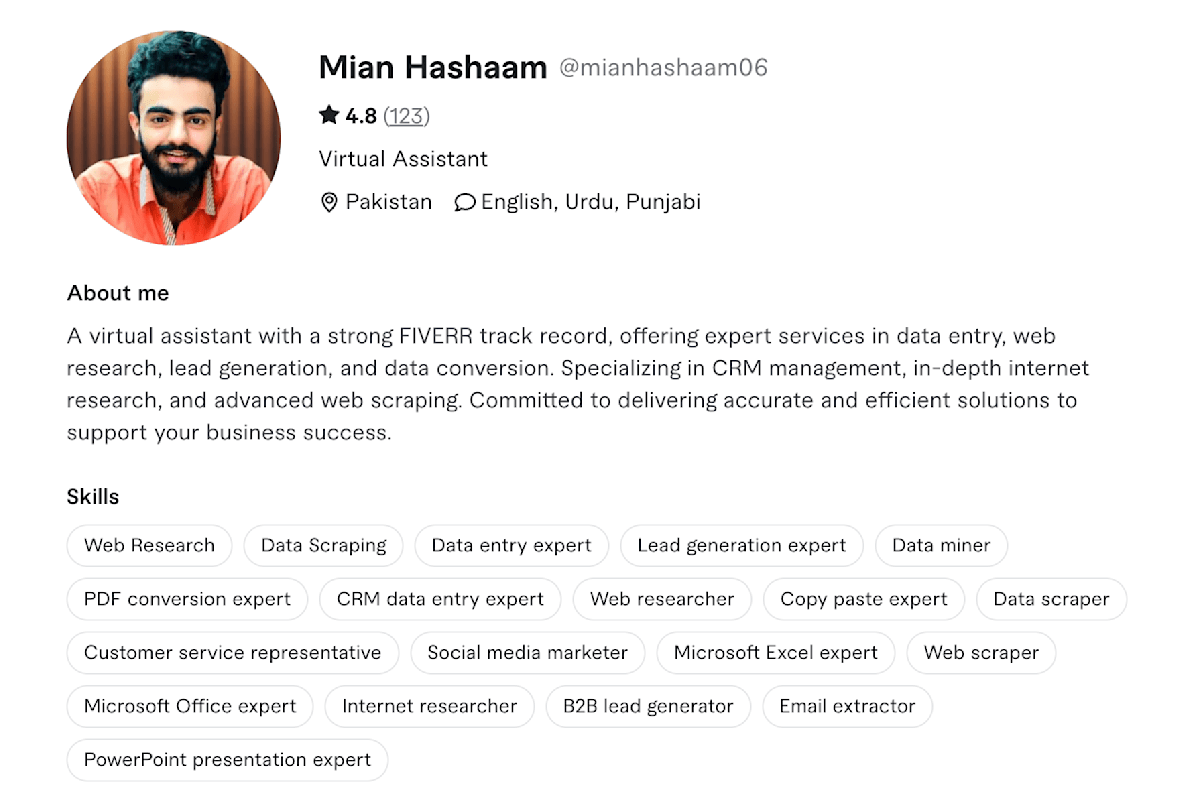
“Many organizations explicitly permit scraping through APIs, which are designed for programmatic data access. These APIs often come with usage agreements to ensure compliance with the law.”
Connect with FreelancerWhenever possible, web scrapers should check whether an API is available before resorting to direct scraping. This minimizes legal risks and aligns data collection with site policies.
The ethical and legal path to web scraping
Navigating the complexities of ethical web scraping can be challenging, especially with evolving regulations and site-specific restrictions.
If you have questions or need expert guidance, Fiverr Answers is the first place to look. Whether seeking best practices or legal insights, Fiverr freelancers can provide custom advice—or even help you implement legally compliant scraping strategies.
